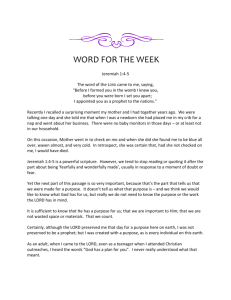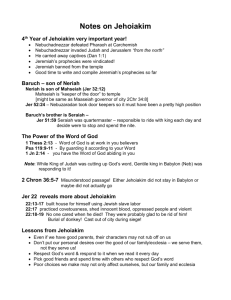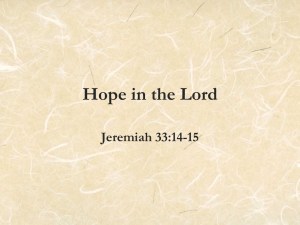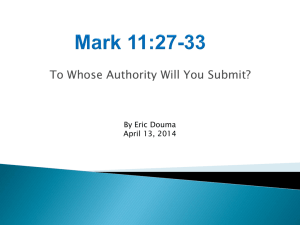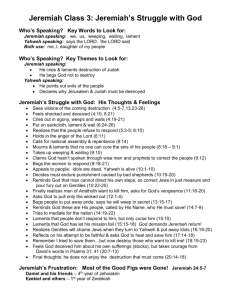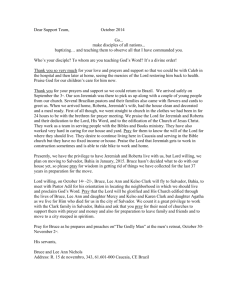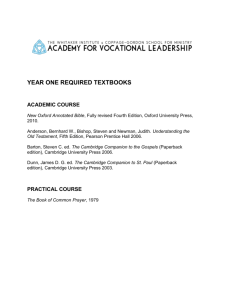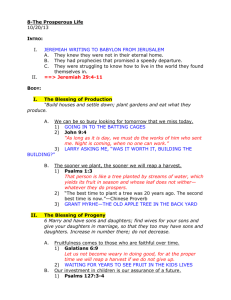PowerPoint file - Fellowship in Montreal
advertisement
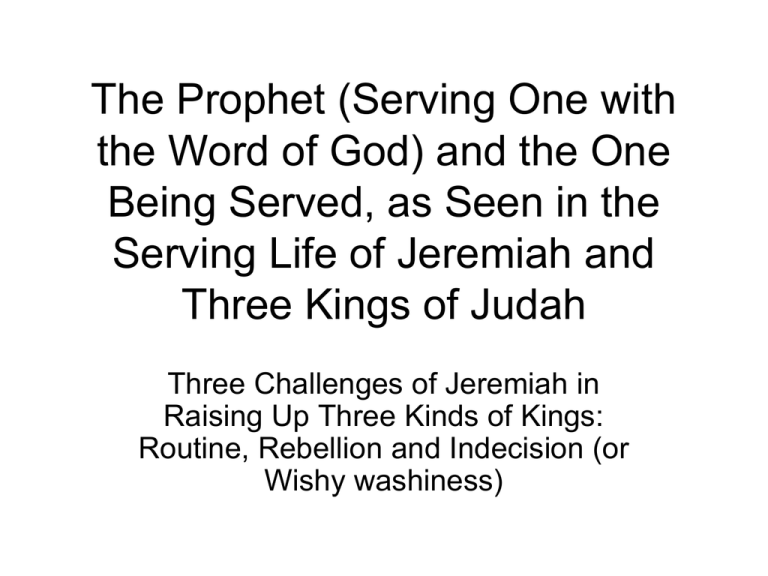
The Prophet (Serving One with the Word of God) and the One Being Served, as Seen in the Serving Life of Jeremiah and Three Kings of Judah Three Challenges of Jeremiah in Raising Up Three Kinds of Kings: Routine, Rebellion and Indecision (or Wishy washiness) • • • • • • • • • • • • 2100 BC: God’s promise to Abraham 2000 BC: Jacob is born 1900 BC: Joseph sold into slavery 1446 BC: Exodus begins 1406: Israel begins establishing itself as a sovereign country 1400 BC: Israel ruled by judges 1050 BC: Saul becomes Israel’s first king 1010 BC: David becomes king of Israel 970 BC: Solomon becomes king, builds temple 926 BC: Israel becomes divided kingdom 721 BC: Assyrians conquer northern kingdom of Israel 586 BC: Babylon destroys Jerusalem and the temple Jeremiah • A son of a priest from Anathoth in the land of Benjamin • But called to be a prophet • Many times, God calls us to serve Him not necessarily according to what we think we are qualified to do. • Jeremiah may have expected to serve God as a priest. • Yet God wanted him to speak as a prophet. • This forced him to go beyond himself, to be stretched. • God will stretch us to force us to depend not on our natural ability, but on Him. • 628 BC to 586 BC • A period of at least 42 years • He lived in the last years of the kingdom of Judah before, during, and after the siege of Jerusalem by Nebuchadnezzar, king of Babylon. • He prophesied during the reign of 4 kings: 1. Josiah 2. Jehoiakim 3. Jehoiachin 4. Zedekiah • The Last Five Kings of Judah 1. Josiah • Reigned 31 years (640-609 BC) 2. Jehoahaz (Shallum) • Reigned 3 months (609 BC) • Taken prisoner to Egypt by Pharaoh Neco 3. Jehoiakim (Eliakim) • Reigned 11 years (609-598 BC) • Died in Jerusalem 4. Jehoichin (Jeconiah, Coniah) • Reigned 3 months (December 9, 598 - March 16, 597 BC) • Taken prisoner to Babylon by Nebuchadnezzar (with Ezekiel) 5. Zedekiah • Reigned 11 years (597--586 BC) • Taken prisoner to Babylon by Nebuchadnezzar Definition of « Jeremiah » • Jeremiah, in Hebrew, means « God exalts, and God tears down » • Meaning that Jeremiah had to experience God’s raising up and God’s tearing down of himself • This means that a prophet must experience what he speaks to others Jeremiah’s Calling • Known by God before his conception • Set apart by God from his mother’s womb • Appointed by God as a prophet Before I formed you in the womb I knew you; Before you were born I sanctified you; I ordained you a prophet to the nations (1:4-5) Jeremiah’s Response • I do not know how to speak, for I am too young God’s Response • • • • God touches Jeremiah’s mouth Everything I command you, you shall speak A prophet’s mouth must be touched by God. It is not just a matter of speaking, or speaking our portion, but of being touched and broken by God • God puts His words in Jeremiah’s mouth, to destroy and build up. Jeremiah had to himself experience this in his own life Jeremiah’s Vision • God asks Jeremiah, « What do you see? » • God asks us the same question. • If we want to prophesy for the Lord as a serving one, we have to see something. • First, Jeremiah sees the rod of an almond tree • This means that God is watching over His word to perform it • Secondly, Jeremiah sees a boiling pot. • This refers to the sin of the children of Israel in forsaking God and turning to idols, and God’s judgment on them. • Based on his vision, Jeremiah is charged by God not to be afraid, but to speak. • God is honest with Jeremiah to tell him that his words will be rejected. • However, God is with him and will deliver him. • This is one of the first lessons of a serving one. A serving one speaks to others, yet in his speaking, the main thing that God is after is to speak to him first, and to save him first. If God can deliver me, He can deliver others also. Characteristics of Jeremiah • • • • • One of the most human of prophets Full of feeling towards the people Called the weeping prophet Never distancing himself from the people Ready to suffer shame at the hands of the people • Willing to go through physical demonstrations in order to illustrate his point Characteristics of Jeremiah • Desperate to release his burden, and devastated when people do not receive his burden: O LORD, You induced me, and I was persuaded; You are stronger than I, and have prevailed. I am in derision daily; Everyone mocks me. For when I spoke, I cried out; I shouted, “Violence and plunder!” Because the word of the LORD was made to me A reproach and a derision daily. Then I said, “I will not make mention of Him, Nor speak anymore in His name.” But His word was in my heart like a burning fire Shut up in my bones; I was weary of holding it back, And I could not (20:7-9) First Challenge: Routine Jeremiah Begins His Ministry: Raising up Josiah • He began his ministry during the 13th year of the reign of Josiah, that is when Josiah was 21 years old (Josiah was 8 years old when he began to reign) • Right after Josiah had begun to purge Judah of the high places and the idols • Five years later, under Jeremiah’s speaking and shepherding, Josiah decides to repair the temple of God (at the age of 26). • It is during that time that the book of law is found. • It is also during this time that the Passover is held. In Raising Up a Young Person • Josiah, a young brother learning how to serve in the church life • At age 16, 5 years before Jeremiah began to serve him, he began to seek after the God of David his father (2 Chronicles 34:3) Training Josiah Not to Be in Routine or Oldness • Josiah had grown quite well, and was positively following the Lord • Yet Jeremiah is keen to warn Josiah against complacency and routine: For My people have committed two evils: They have forsaken Me, the fountain of living waters, And hewn themselves cisterns broken cisterns that can hold no water (2:13) Jeremiah continues • • • • • • The LORD said also to me in the days of Josiah the king: “Have you seen what backsliding Israel has done? She has gone up on every high mountain and under every green tree, and there played the harlot (3:6) Jeremiah points out the sin of Israel and Judah to Josiah. Josiah was seeking the Lord. He was therefore able to receive this strong word concerning the people, which would force him to go to the Lord in His light to repent even further. Jeremiah did not let Josiah become complacent because of his positive attitude in following the Lord. The more we follow the Lord, the more we are brought into His light concerning the condition of God’s people. The more the Lord exposes our own condition, the more we are able to see the condition of others and minister to their need. A Hidden Ministry • There is no mention of Jeremiah’s role in raising up Josiah, neither in 2 Kings nor in 2 Chronicles. • The only mention of Jeremiah in the books of history is at Josiah’s death. • Jeremiah laments Josiah’s death. • This may indicate that Jeremiah’s ministry, as far as the public record is concerned, was hidden and behind the scenes. Further Challenge for Jeremiah • During Josiah’s reign, the situation had changed for the better. • Josiah was a king who was able to lead the people to the proper worship of God. • There was a revival in Judah, seen in the way that the Passover was celebrated. • However, Jeremiah, as a prophet with vision, saw the need to continue his ministry with Jehoiakim. • This shows that Jeremiah was not content with merely fulfilling his ministry with Josiah. • He was burdened for Jehoiakim, Josiah’s son, even though Jehoiakim lacked the qualities of his father. • As a serving one, do we pick and choose, or compare those we serve with ones we served in the past? • Or do we take what God gives us, and labor with burden and vision to bring that one into God’s way and heart? Second Challenge: Rebellion • Routine leads and blossoms into rebellion • The routine apparent during the reign of Josiah manifests itself during the reign of Jehoiakim The word that came to Jeremiah from the LORD, saying, “Stand in the gate of the LORD’s house, and proclaim there this word, and say, ‘Hear the word of the LORD, all you of Judah who enter in at these gates to worship the LORD!’” Thus says the LORD of hosts, the God of Israel: “Amend your ways and your doings, and I will cause you to dwell in this place. Do not trust in these lying words, saying, ‘The temple of the LORD, the temple of the LORD, the temple of the LORD are these’ (7:1-4) • The more we have spiritually, the more we will boast. • The temple had been built by Solomon • The temple had been restored by Josiah • There was a lot to boast about. • But there was no reality in the daily living of the king. • No fruit, no expression of what they boasted in. Jehoiakim • Jehoiakim was 25 years old when he began to reign • His reign came after his brother Joahaz or Jehoaz reigned for 3 months in Jerusalem, and then was deposed by the king of Egypt. • Jehoiakim was made king by the king of Egypt. • He reigned 11 years. • He did what was evil in the sight of Jehovah. • He is often referred to as Jehoiakim, the son of Josiah • This indicates that there was no spiritual continuation or reproduction with Josiah. Jeremiah’s Labor with Jehoiakim • All of Jeremiah’s speaking is according to the word of the Lord to him. • The word that Jeremiah speaks is at a precise time, during a particular moment of the reign of Jehoiakim: Now it came to pass in the fourth year of Jehoiakim the son of Josiah, king of Judah, that this word came to Jeremiah from the LORD, saying (36:1) • Finding a way to impart the word of God to the people and to the king. Jeremiah’s Labor with Jehoiakim • Using the religious setting and gatherings to speak the word of God: In the beginning of the reign of Jehoiakim the son of Josiah, king of Judah, this word came from the LORD, saying, “Thus says the LORD: ‘Stand in the court of the LORD’s house, and speak to all the cities of Judah, which come to worship in the LORD’s house, all the words that I command you to speak to them. Do not diminish a word. Perhaps everyone will listen and turn from his evil way, that I may relent concerning the calamity which I purpose to bring on them because of the evil of their doings.’ And you shall say to them, ‘Thus says the LORD: “If you will not listen to Me, to walk in My law which I have set before you, to heed the words of My servants the prophets whom I sent to you, both rising up early and sending them (but you have not heeded), then I will make this house like Shiloh, and will make this city a curse to all the nations of the earth.”’” So the priests and the prophets and all the people heard Jeremiah speaking these words in the house of the LORD. • Jeremiah struggled to release the burden of the Lord within the given situation. • This means that in the church life, we have limitations and restraints within which we must operate. • Even if religion or routine characterizes our church life, we can still serve in that situation with the word of God until the Lord says otherwise. • There is still hope for our heart to turn back to the Lord, away from our religious fervour and pride. How Is Jeremiah Able to Release His Burden to Reach Jehoiakim? • In chapter 36, Jeremiah realizes that he is not able to come directly into the king’s presence. • He does not give up. He finds a way. • He dictates the word of the Lord to Baruch who writes it down on a scroll • He commands Baruch to read the word to the people in the house of Jehovah during a fast • One man, Micaiah, hears the words. • Micaiah goes to the princes (the rulers) and narrates all the words that he had heard • The princes respond by asking Jehudi to bring Baruch to read to them the scroll • Baruch reads the scroll to the princes • The princes are convicted • They realize that they must report these words to the king Jehoiakim’s Response • The king sends for Jehudi to read the scroll to him • Jehudi reads the scroll to the king • As he reads 3 or 4 columns, the king cuts out that section with a knife and throws it into the fire • The king and his servants were not afraid and did not tear their garments • The king did not listen to the nobles who urged him not to burn the scroll • The king orders Jeremiah and Baruch to be arrested • God hides Jeremiah and Baruch Application to Our Church Life: As Serving Ones • As Jeremiah, as serving ones, we need to find an entrance into the heart of those we serve, even if they might not want to listen to us. • Jeremiah did not let the situation defeat him. • Rather, he worked with Baruch, one individual. • Eventually, it was through Micaiah, another individual, that the princes were touched. • Our labor may be with many people, but we should always have a few specific ones as our burden. • Our labor on a few may open the way for the many to be touched. As Those Being Served • Jehoiakim was not present during the fast. • Therefore, he was not able to listen to the word of the Lord through Jeremiah. • This means that even in our weak spiritual condition, even in our lack of much reality, the word of God can still be spoken to touch us. • Instead, Jehoiakim was sitting in his winter palace in front of a blazing fire while the fast was going on. • Sometimes, we like to forsake the gatherings or spiritual exercise to avoid religion. • Such a practice can lead us even further away from the Lord. • Eventually, when a specific word comes to us, we will, like Jehoiakim, take a knife and cut out that word from our lives. Cutting Out the Word of God and Burning It • Any word from God that does not fit my person or character • Any word from God that does not fit into my sphere of operation • Any word from God that does not fit into my understanding of the truth or the Bible • Any word from God that threatens to upset my comfortable existence in the church life • Any word from God that threatens the peace in my church life Leading Eventually to Rebellion • • • • • • • God no longer has a way to speak to us We become settled in our ways We become old and routine There is no freshness in our pursuing There is no, or little fruit We do not shepherd or raise up people Yet we handle spiritual things and even boast in them. What Can We Learn From This? • As Josiah, we must have a pursuing heart and exercise • Josiah listened to Jeremiah and let Jeremiah’s word operate in him. • Eventually, Jeremiah’s word became God’s word to him. • As Jehoiakim, the biggest danger is being settled and content, yet thinking that we are pursuing. • When the word comes to us, do we bring that word to the Lord in prayer, or do we cut it out of our lives and burn it? • As Jeremiah, we need to labor with a few and seek to find ways for the word to gain an entrance in the hearts of the people we labor with.
